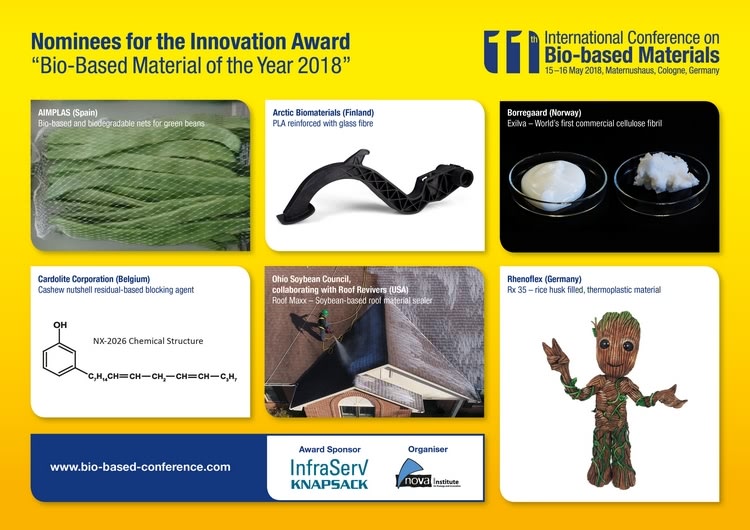 Innovation Award “Bio-based Material of the Year 2018” goes to Arctic Biomaterials from Finland for degradable glass fibre reinforced PLA.
Innovation Award “Bio-based Material of the Year 2018” goes to Arctic Biomaterials from Finland for degradable glass fibre reinforced PLA.The second winner is Cardolite Corporation (US/Belgium), with a cashew nutshell residual-based blocking agent, and the third winner is AIMPLAS (Spain) with biodegradable nets for green beans. The special award of the jury was given to Warka Water (US) for a water collecting bio-based tower in dry areas.
The Innovation Award "Bio-based Material of the Year 2018" was awarded to three innovative bio-based materials. The competition focused on new developments in the bio-based economy, which have a market launch in 2018. The winners were elected on 15 May by the participants of the “11th International Conference on Bio-based Materials” in Cologne, Germany. As in the previous year, the award was sponsored by InfraServ GmbH & Co. Knapsack KG, a service provider for the planning, construction and operation of plants and sites.
The “International Conference on Bio-based Materials” is organised by nova-Institute (Germany) and a well-established global meeting point for companies working in the field of bio-based chemicals and materials. 205 participants, mainly from the industry and representing 22 countries, met in Cologne on 15 and 16 May 2018 to discuss the latest developments in the sector. 21 companies presented their products and services at the exhibition.
The “International Conference on Bio-based Materials” is organised by nova-Institute (Germany) and a well-established global meeting point for companies working in the field of bio-based chemicals and materials. 205 participants, mainly from the industry and representing 22 countries, met in Cologne on 15 and 16 May 2018 to discuss the latest developments in the sector. 21 companies presented their products and services at the exhibition.

The winners in detail:
No 1: Arctic Biomaterials Oy (Finland): Degradable PLA reinforced with glass fibre that erodes back to harmless minerals in composting environment
ArcBioxTM BGF30-B1 is a Polylactic Acid (PLA) that is reinforced using LFT (long fibre) technology with a special degradable glass fibres. This innovation makes it possible that bio-based plastics can be used in technically demanding durable applications and still have the option of biodegradation at the end of life. The reinforcement is a glass fibre developed by Arctic Biomaterials Oy (ABM) and can also be used for several other bio-based polymers. This composite material reduces the carbon footprint and use of non-renewable energy of a composite product drastically compared to fossil-based reinforced plastics. This reinforced PLA is compostable and certified by the seedling mark from DIN CERTCO.No 2: Cardolite Corporation (US/Belgium): Cashew nutshell residual-based blocking agent
NX-2026 is an ultra-high purity 3-pentadeca-dienyl-phenol recently developed by Cardolite through advanced proprietary process technology. 3-pentadeca-dienyl-phenol is the main component distilled from cashew nutshell liquid, a renewable and non-edible resin extracted from the honeycomb structure of the cashew nut. NX-2026 has been successfully introduced to the coating and adhesive market as a non-toxic isocyanate (NCO) blocking agent that is a suitable replacement for petrochemical phenols. NCO systems blocked with NX-2026 provide lower viscosity and deblocking temperature than equivalent systems blocked with phenols. Moreover, NX-2026 blocked NCO prepolymers can be used in 2K epoxy systems to improve bond and T-peel strengths while maintaining good cure properties.No 3: AIMPLAS Instituto Tecnológico del Plástico (Spain): Bio-based and biodegradable nets for green beans
A packaging material which is more than 80% bio-based and more sustainable than conventional polyethylene nets but has similar linear weight and mechanical properties. The innovative product is a biodegradable net suitable for green beans packaging. A compound has been developed through reactive extrusion and the combination of different biodegradable materials and additives. Chemical modification was made by grafting low molecular weight units, such as oleic alcohol, obtained by the fermentation of sugars extracted from vegetable waste (watermelon).Source: nova-Institute


